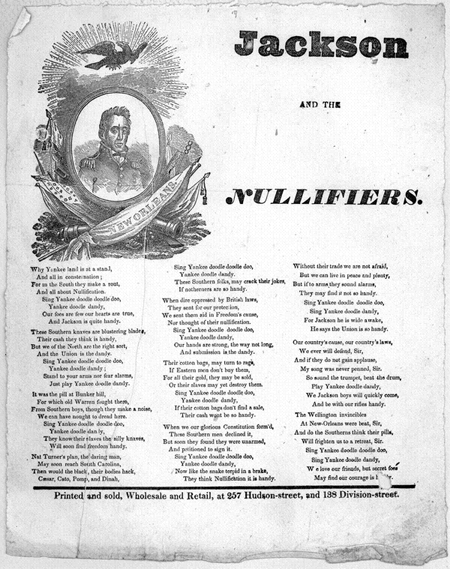Today in History: Nullification Crisis

Today in History–January 13–the Library of Congress features the Nullification Crisis. On this date in 1833, President Andrew Jackson wrote his new president Vice President Martin Van Buren affirming his commitment to preventing South Carolina’s defiance of federal authority by nullifying national tariff laws. The Nullification Crisis began in November, 1832 when South Carolina nullified a federal tariff. On December 10, 1832 Jackson issued a proclamation promising to uphold the federal tariff and warned “disunion by armed force is treason.” Although Congress authorized the use of military force against any state that resisted the tariff acts, the crisis ended in March, 1833 when the Compromise Tariff of 1833 was passed. Learn more by visiting the Today in History section, then click the links below to access related primary sources.
Tariff Act 1828 historical newspaper coverage
Tariff Act 1832 historical newspaper coverage
The Tariff. South Carolina, Protest
South Carolina Ordinance of Nullification November 24, 1832, Avalon Project at Yale Law School
President Andrew Jackson nullification proclamation Dec. 10, 1832
The President’s Proclamation Delaware Gazette and American Watchman. (Wilmington, Del.), 14 Dec. 1832
Letter, Andrew Jackson to Martin Van Buren discussing the nullification crisis 13 January 1833
Andrew Jackson to Andrew I. Crawford Wednesday, May 01, 1833 (Nullification and slavery)
James Madison nullification correspondence
Printed ephemera
- Jackson and the nullifiers … Printed and sold, wholesale and retail, at 257 Hudson-street, and 138 Division-street. [1832]
- Preamble and resolutions on the subject of the South Carolina ordinance … Resolution in relation to a call of a convention to amend the constitution of the United States … Resolution relating to the President’s proclamation and message … [Dated at] Columbus, Ohio. Feb. 25, 1833
- Proposals by Thomas W. White, for publishing in the City of Richmond, a new tri-weekly newspaper, to be styled The friend of the union, and advocate of state rights … August 26, 1833
- The select committee to which was referred “so much of the Governor’s message as relates to the resolutions from the states of Louisiana, Maine, New-Hampshire, and Pennsylvania, with the accompanying documents,” beg leave to report … the adoption of the following resolution … Resolved that the doctrine of nullification is contrary to the letter and spirit of the constitution … [Jackson, Mass. 1833]
- Should the nullifiers succeed in their views of separation, and the Union be in consequence dissolved, the following will be an appropriate epitah
- State of New Jersey. Whereas the people of the state of South Carolina in convention assembled … Therefore, in the name and in behalf of the people of the state of New Jersey, and as their legal representatives. Be it resolved. [ 8 resolutions of the New Jersey General Assembly in opposition to South Carolina nullification] [Trenton, 1833]
- State rights & nullification ticket. For State convention. Samuel E. Nelson. Thomas G. M’Fadden. John L. Felder. [1832?]
- Washington City, March 2, 1833. Sir: The present session of Congress closes this day, and although but few of the subjects introduced have been finally acted upon, I flatter myself that much good has been done for our country … John Tipton
Nullification political cartoons
Nullification: historical newspaper coverage 1832-33
Today in History: Andrew Jackson
